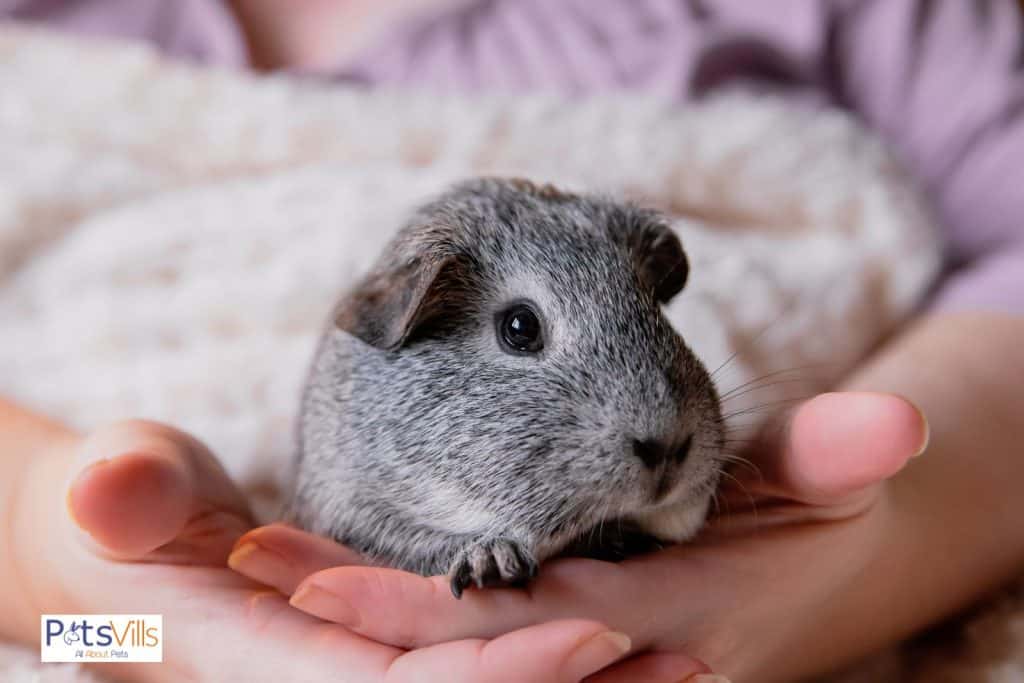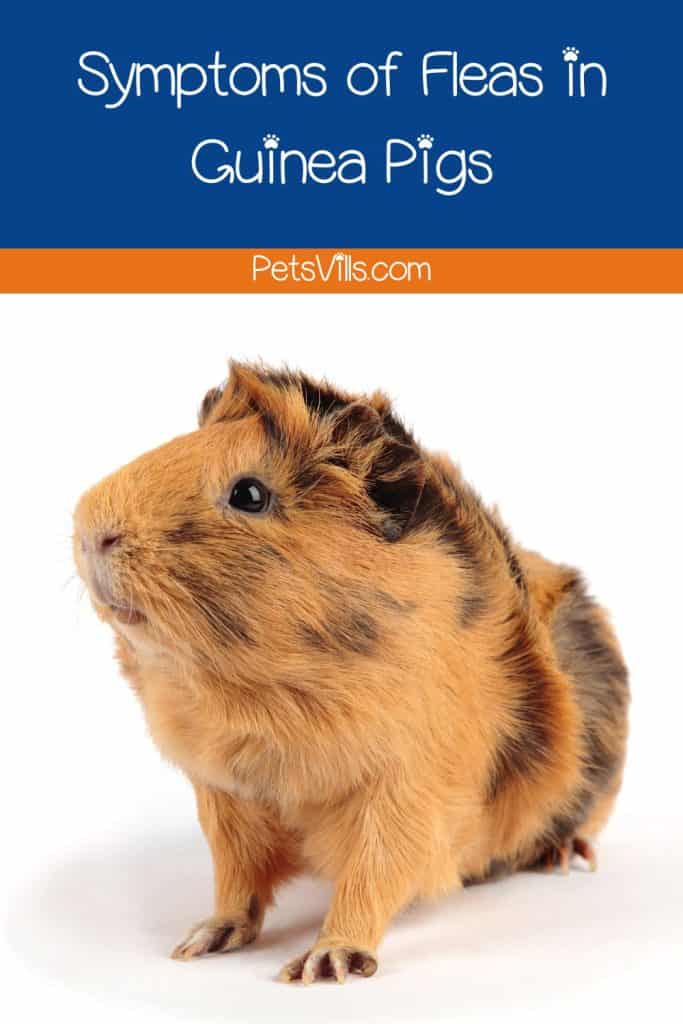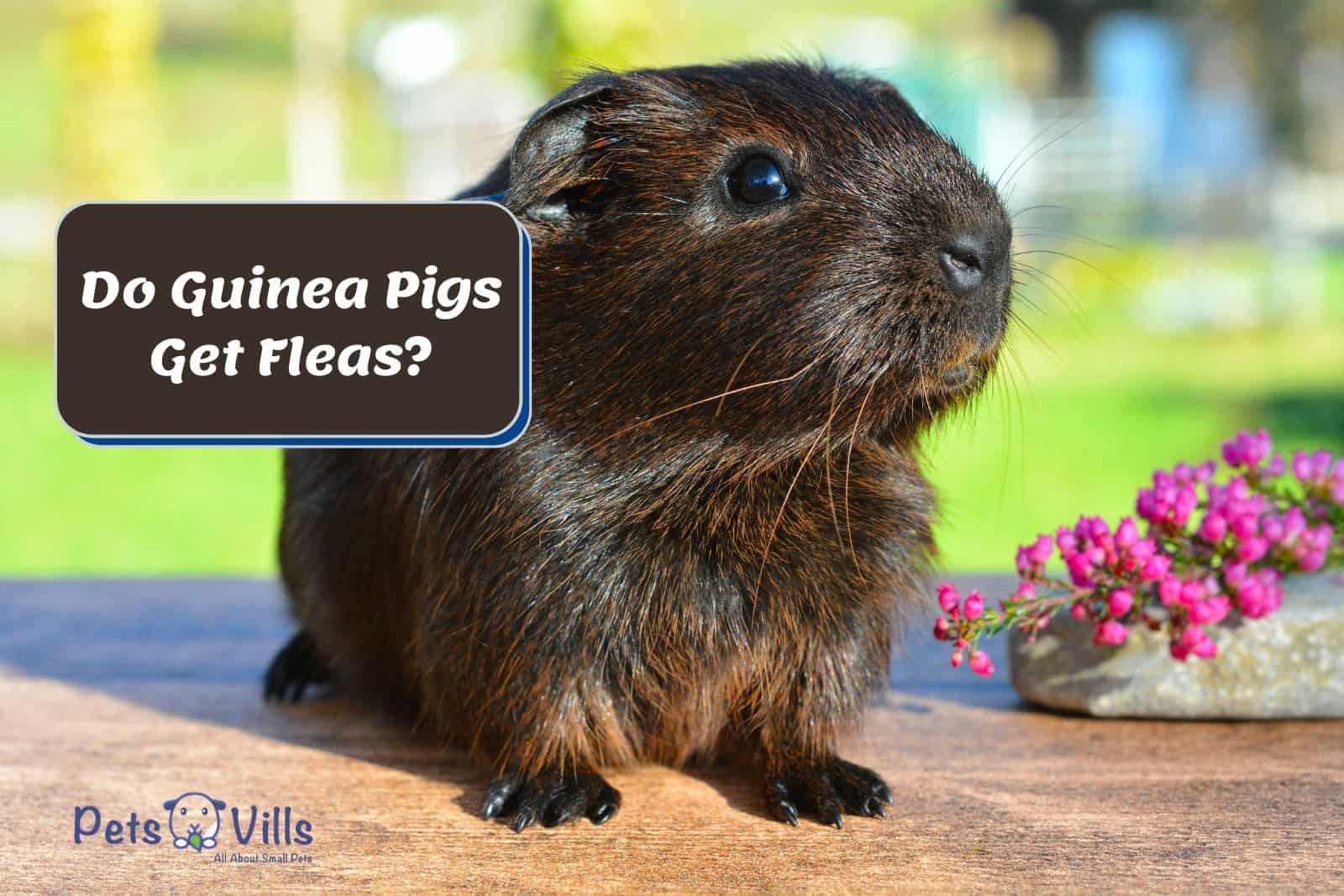“Do guinea pigs get fleas?” You might wonder as you snuggle your sweet, squeaking bundle of fluff.
As a seasoned guinea pig parent, I’m here to tell you that guinea pigs can get fleas [1].
However, don’t let your hearts palpitate, dear piggie parents!
Strap in for a wild, whisker-twitching ride as I delve into the world of guinea pigs and fleas, filled with fun facts, expert advice, and plenty of carrot-crunching anecdotes.
Table of Contents
Key Takeaways
- Even though fleas are more commonly associated with pets like dogs and cats, guinea pigs can also become hosts for fleas. They can pick up fleas from various sources, including other animals or flea-infested areas.
- Guinea pigs can be exposed to fleas from several sources, such as outdoor play areas, other pets in the household, or even from the pet parent’s clothing. Understanding these risks and taking appropriate measures to minimize exposure is crucial.
- There are effective strategies to prevent and control these infestations. Some examples include regular checks, proper grooming, keeping the living environment clean, and seeking professional veterinary advice.
Do Guinea Pigs Get Fleas?
The first thing to know is that your adorable guinea pigs can get fleas [1]. Having raised guinea pigs for years, I’ve even learned a thing or two about flea infestations.

Their presence usually comes from contact with animals or spending time in a flea-contaminated environment. But where are these fleas coming from to land on your piggy’s body?
These tiny pests are notorious for their love of furry, humid environments [2]. As a result, fleas can be found in common outdoor areas such as gardens or parks.
They can also hitch a ride on your clothes or other pets. This means your outdoor excursions could unknowingly turn into a flea transportation service!
My piggies love their playtime outdoors. But I’ve learned that this exposes them to potential flea populations.
I always thoroughly check and clean up after their little adventures. Otherwise, I’d be leaving myself open to the nightmare of a flea infestation.
If your guinea pig shares a home with other pets, especially cats or dogs, they could be at risk of fleas. They don’t discriminate, and they’ll hop from animal to animal.
3 Symptoms of Fleas in Guinea Pigs
These common parasites are tiny, but the effects of fleas are far from it. So let’s look closely at some classic symptoms of a cavy suffering from a flea infestation.
#1 Skin Irritation
The most obvious sign of flea-infested guinea pigs is skin irritation. Look out for excessive scratching, itchy skin, or biting to indicate your cavy’s new unwanted guests.
You won’t get a moment of peace if you’re around a cavy with flea issues. It won’t be hard to tell when they’re keeping you up at night with their biting or scratching.
#2 Hair Loss
Another telltale sign is hair loss, as you may notice bald patches on your piggy’s body. Remember, they aren’t going for the latest hair trend, likely due to fleas causing irritation.
If fleas aren’t the cause of the hair loss, I’d suggest checking out this video. It helped me significantly when I couldn’t figure out what was happening with mine.
#3 Behavioral Changes
I can tell you that a happy guinea pig is active and curious. These critters are a bundle of joy when issues like fleas aren’t hampering them.
So if your guinea pig seems more lethargic or less interested in exploring, it’s always a cause for concern. These issues could’ve occurred due to the discomfort caused by fleas.
Risks and Complications Associated with Guinea Pig Fleas
Fleas aren’t just annoying; they can also lead to health issues. These little nuisances can cause skin infections and transmit parasites.
In my experience, fleas can also lead to anemia in severe cases: a weak, pale guinea pig is a cause for concern. If you notice these symptoms, seek veterinary help right away.
Overall, the best advice I can give is to stay vigilant. Keep a close eye on your guinea pig’s behavior and coat condition.
These blood-sucking parasites might be tiny, but their impact on our beloved guinea pigs can be significant. Remember, a healthy guinea pig is a happy guinea pig!
Diagnosis and Treatment of Fleas in Guinea Pigs
First things first, how do we diagnose fleas? It’s a little bit like playing detective. One method I’ve used is the ‘white towel test.’
Simply place your guinea pig on a white towel and gently comb for fleas. Flea dirt, which looks like tiny black specks, will be easier to spot against the white background.
But you can’t always rely solely on our amateur sleuthing skills and flea dirt. That’s where our trusty vets come in.
These professionals can perform a thorough examination and confirm a flea infestation. Never underestimate the power of professional advice!
Treatment Options for Fleas
Over the years, I’ve found that using a guinea pig-safe flea treatment is vital. It’s one of the only ways to ensure flea issues become a thing of the past.
The most common safe treatment is pyrethrin-based cat flea powder. However, according to a study, “selamectin is a topical parasiticide that has also been effective in guinea pigs” [3].
But not all treatments are like these two, and some can be pretty harmful. I always check with my vet before using any products to avoid complications.
Let’s remember vets’ crucial role in the treatment process. Vets can provide effective flea treatment options and dosages for your specific guinea pig.
They are the superheroes in this flea-fighting saga. After all, these experts provide much-needed medical advice and support.
Meanwhile, treating the environment is equally important. Thoroughly clean your guinea pig’s habitat and your home to ensure no fleas are left lurking in corners.
Remember, it’s not just about treating an infestation but also preventing the next one. Regular checks and proper care are your best weapons in this flea battle.
As I always say, a proactive cavy parent is a successful one!
Learn more in this video:
Preventing Flea Infestation in Guinea Pigs
I’ve learned a few things about flea prevention as an animal lover. So here’s a little run down of a few tricks and tips I’ve found effective over the years.
#1 Regular Grooming Sessions
My top prevention tip would be regular grooming sessions. These not only keep their coat looking fabulous, but they’re also an excellent opportunity to check for any signs of fleas.
It also provides some extra bonding time with their furry friend. I don’t know any cavy parent would pass up that opportunity.
#2 Keep Up With Check-Ups and Maintenance
Your next course of action is regular check-ups and maintenance. It’s like taking your car in for servicing but much cuter!
Regular vet visits can help detect any potential issues early. Trust me; your piggies will thank you for it.
#3 Be Vigilant About Habitat Cleanliness
But what about their living quarters? A good rule to follow is a clean habitat is a happy habitat.
Honestly, using clean cage bedding and play areas can make a world of difference. Think of it as your contribution to the anti-flea movement!
#4 Don’t Forget About Your Other Household Pets
Now, let’s talk about your home. If you have other pets, make sure they’re also flea-free.
Fleas can be social butterflies, jumping from one host for fleas to another. Regularly treating all pets is the key to a flea-free home.
FAQs
#1 What are the signs of fleas in guinea pigs?
Signs include excessive scratching, hair loss, redness, and changes in behavior like lethargy or decreased activity.
#2 Can fleas harm my guinea pig?
Yes, fleas can cause skin infections, transmit parasites, and in severe cases, lead to anemia in guinea pigs.
#3 Do all guinea pigs get fleas?
Not all guinea pigs get fleas, but they are susceptible if exposed to an infested environment or pet.
Conclusion
As you’ve discovered, the answer to “do guinea pigs get fleas” is a resounding yes. But fear not, fellow enthusiasts, as you have tools to keep your piggies happy and flea-free.
Remember, early detection is vital, and stay vigilant for symptoms like scratching or hair loss. These are telltale signs your pig is hosting these unwelcome guests.
The importance of prevention also cannot be overstated. Regular grooming, clean living conditions, and routine vet checks are your best defense.
And if your piggy does get fleas, swift and appropriate action is critical. Trust in professional advice and treatment to ensure your cavy bounces back quickly.
As seasoned guinea pig parents, you can handle anything, even fleas. So, are you ready to join the flea-fighting squad and protect your piggies from these troublesome intruders?

Resources:
1. Harkness JE, Murray KA, Wagner JE. Biology and Diseases of Guinea Pigs. Laboratory Animal Medicine. 2002;203–46.
2. Preventing fleas in the yard | CDC [Internet]. Centers for Disease Control and Prevention. 2020 [cited 2023 Jun 7]. Available from: https://www.cdc.gov/fleas/avoid/in_the_yard.html
3. O’Rourke DP. Disease Problems of Guinea Pigs. Ferrets, Rabbits, and Rodents [Internet]. 2004;245–54. Available from: https://www.ncbi.nlm.nih.gov/pmc/articles/PMC7150066/#:~:text=Guinea%20pigs%20are%20susceptible%20to

My name is Ben Roberts, and I absolutely love animals. So, naturally, I love writing about them too! As far as my animals, I have a Pit-bull, a Beagle-lab mix, a Chihuahua, and one old cat. Each one of them provides me with a new adventure every day. And the best part is they’re all best friends. Well, except the cat when he gets a little annoyed.
FIND HIM ON: FACEBOOK and TWITTER.
Read his latest ARTICLES
Learn more about Benhere


